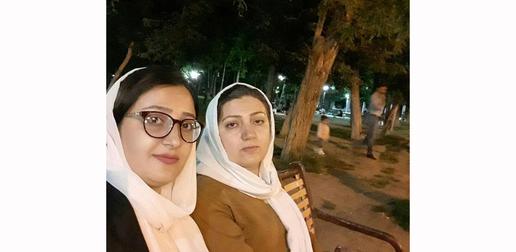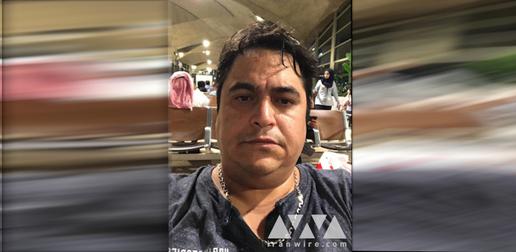Parnian Yeganeh has posted dozens of pictures of herself wearing white headscarves on Instagram as part of the White Wednesdays campaign against Iran’s law on mandatory hijab. Every Wednesday she and her mother — who appears alongside her daughter in some of the Instagram posts — wore white headscarves, until Yeganeh and her husband were forced to leave the country after continued pressure from security agencies, trumped-up charges against them and repeated summons to court.
Yeganeh was one of the first Iranian women to join the White Wednesdays campaign and to post photographs and videos of her activities on social media. “I was against forced hijab long before that but when Masih Alinejad launched the White Wednesdays campaign I thought that because this movement has an emblem of its own, it is going to be more effective,” Parnian Yeganeh tells IranWire. “So my mother and I joined it.”
“I remember it well,” Yeganeh said when I asked her about how she joined the campaign. “It was May 24, 2017, the anniversary of the day when Khorramshahr was liberated [from Iraqi occupation in 1982]. When Masih Alinejad announced the White Wednesdays campaign, I discussed it with my mother. My family then lived in the city of Saghez in Kurdistan Province but I was a student of architecture in Tehran. The first time my mother and I went out in Saghez, I posted my pictures and videos on my Instagram page and then sent them to Masih Alinejad. In the coming weeks we continued our protests both in Saghez and in Tehran.”
Yeganeh was given her first summons after she posted the photos of herself. “We were summoned to the revolutionary court in Saghez,” she says. “They had notified me that the Intelligence Bureau of Saghez had filed a two-count complaint against me: first, participating in the White Wednesdays campaign and, second, encouraging other women to remove their hijabs. My mother and I went to the revolutionary court. The very first thing they said was that we had to bring collateral so we could be released on bail after we talked to the judge. Mr. Nader Alizadeh-Seresht, the judge, told me: ‘come and write down that you have made a mistake and pledge that you will remove all the videos and pictures. In return we will forgive you and the case will be closed.’ But I refused and the story continued.”
Unsavory Homework as Punishment
Yeganeh said that the judge repeatedly told her, in the presence of her parents, “Say you have made a mistake and you can go.” But when she refused to repent, the judge immediately sentenced her to one year in prison, 74 lashes and a fine of five million tomans ($840) in cash. “The judge told me, ‘you are guilty of propaganda against the regime through your online activities, but since you don’t have a private plaintiff I suspend this sentence for nine months. Instead, each month you must write a 20-page research paper on the necessity of hijab in society and bring it to me. And if you continue your activities then I shall un-suspend the verdict.'”
She was a student at the time, she says, and did not want to be expelled from university so she did not post anything about the summons or the possibility of her arrest and decided to keep a low profile. “During those nine months I had to research as to why hijab is good,” Yeganeh tells me. “There was an internet café opposite the courthouse. I would go there a few hours earlier and would pay the owner of the café for the printout of the search that he had done on my behalf. I would page through them and then I would take them to the judge. This was the most painful punishment that they could have given me."
Parnian Yeganeh says that her family always supported her and her activities but after the summons became more serious, they asked her to be more cautious and less outspoken to prevent her prison sentence from being carried out. “I tried to go along with their advice so that they would feel at peace,” she says, “but then the Greek-language Huffington Post published a lengthy report about the White Wednesdays campaign with a picture of me next to dozens of other pictures. Because of this, I was summoned by Tehran’s Security Police. And every time that I was summoned, they would ask me: ‘Who is guiding you to spread corruption and to encourage other women to take off their hijab?’ One time, an examining magistrate at Tehran’s Security Police headquarters openly told me: ‘if you don’t stop and refuse to write a pledge, I will have them rape you right here.”
She says she had never felt so scared. After returning home, she told her husband about the threat. “He became very upset and on the same day he went to the Security Police to lodge a complaint against the examining magistrate whose first name was Alireza,” she says. “But because of his action and his protest they fabricated a case against him as well.”
A Charge Out of the Blue
In the early spring of 2019, Parnian Yeganeh’s husband was summoned to court. When they went to Branch 25 of the revolutionary court, which was under the supervision of a judge named Ebrahimi, they were told that a case of “smuggling alcoholic drinks” had been opened against her husband, even though he had never engaged in such activities and had no criminal record whatsoever.
Her husband was released on bail but 15 days later, without any summons or warnings, they arrested him on the street. “After the arrest, they first took him to the Security Police,” Yeganeh says, “but since it was after office hours, neither the judge nor the examining magistrate were present, so they took him to the Greater Tehran Penitentiary [Fashafuyeh Prison]. Collateral for bail had been set but for a full 10 days the judge refused to accept it and we had almost no news of each other. This was very hard on us and our families, who had never had a criminal record.”
The authorities had opened not one but three cases against her husband. “For the first case,” Yeganeh says, “he was sentenced to one year in prison and a cash fine on the charge of smuggling alcoholic drinks, but the other two cases remain open.”
After her husband was released, they were both summoned again to the Security Police and learned that a new case had been opened against both of them. “An employee of Branch 21 told us that we had been charged with things like ‘corruption on earth’ and ‘waging war against the Islamic Republic’. My husband had engaged a lawyer since charges against him had been brought and the lawyer told us that these charges are punishable by death. This is when decided to leave. I had to abandon my studies and my family and he had to leave behind his work and his family. Unfortunately, despite the fact that I had stayed silent, incessant summons and trumped-up charges by security agencies against me and my husband prevented me from completing my studies. We were forced to abandon everything and immigrate.”
Before the verdicts against them were finalized, the couple found out that they had not yet been banned from leaving Iran. At the urging of the lawyer and their families, they packed their bags to leave. “Life does not always work out the way you want it,” Yeganeh tells me. “There are many who criticize Masih Alinejad, saying that she forces women to take part in her campaigns, but I did all this out of my own free will and I have paid the price. I could have told the court that I was mistaken and none of these things would have happened. I could have been indifferent to what was going on. But I did not choose repentance. On the contrary, now I am more determined than ever to continue my activities.”
Related Coverage:
Iran: Family of women’s rights activist arrested in despicable attempt to intimidate her into silence, September 27, 2019
The Fake News Campaign to Undermine a Champion of Women's Rights, September 24, 2019
Civil Activist, 21, Sentenced to 24 Years in Prison, August 28, 2019
“I Got Arrested Because I Wasn’t Wearing a Bra”, August 6, 2019
Women’s Rights and Religious Freedom: A Contradiction in Terms?, July 23, 2019
Internet to Blame for “Bad Hijab”, 30 October 2018
Women’s Rights Activists behind Bars, October 1, 2018
Official Report: Support for Compulsory Hijab Plummets, 30 July 2018
Guards Arrest “Revolution Woman” Maryam Shariatmadari, April 27, 2018
Exclusive: Interview with Revolution Woman Narges Hosseini, March 2018
Khamenei Dismisses Hijab Protesters as “Insignificant and Small", March 2018
People Want the Choice on Hijab — But the Regime Won't Listen, February 6, 2018
visit the accountability section
In this section of Iran Wire, you can contact the officials and launch your campaign for various problems


























comments